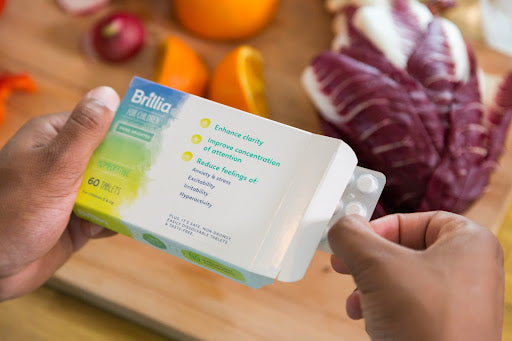If you’re one of the millions of Americans struggling with ADHD or anxiety, or you’re the parent of one, it can be difficult to decide whether or not medication is the right path for you or your child. After all, prescription drugs for ADHD and anxiety are commonly associated with adverse side effects, dependency, and misuse.1 While we know that pharmaceutical drugs can be effective for many, at Brillia we believe they work best as a last resort after gentler routes have been thoroughly explored. Find out how Brillia combines neuroscience with behavioral science to offer an alternative solution to prescription drugs and what we mean by a “holistic” approach.
Using Neuroscience & Behavioral Science to Maximize Results
At Brillia, we advocate for holistic strategies when it comes to addressing mood and attention disorders. This entails taking a more comprehensive look at a person’s symptoms and devising various solutions that impact their mental, physical, and emotional health for long-term success. Rather than attempting to fix one symptom at a time after they’ve already emerged, holistic medicine aims to target the root cause of such symptoms, preventing them altogether without harsh, synthetic chemicals or distracting side effects.
Brillia’s Holistic Five Pillars combine neuroscience and behavioral science to reduce symptoms associated with ADHD and anxiety through unique, targeted ingredients and complementary lifestyle changes. The Five Pillars promote healthy nutrition, adequate sleep, controlled screen time, and mindfulness practices to first set a foundation for whole-body health. These practices work to maximize the success of Brillia’s active ingredient, which consists of antibodies to the S100B protein. The S100B protein plays a crucial role in regulating many different intracellular and extracellular brain processes, such as enzyme activities, calcium homeostasis, and communication between neurons. Since almost all mental and neurological disorders as well as temporal stress-induced conditions are caused by a disturbance of these brain processes, normalizing them is a gentle and efficient way to reinstate balance in mind and body. As a result of this regulating effect, the levels of feel-good neurotransmitters like dopamine, norepinephrine, and serotonin also normalize. These very neurotransmitters are also the target of most prescription drugs for ADHD and anxiety, but Brillia regulates their activity without affecting any other systems in the body.
Find out more about how the following healthy lifestyle changes can help you achieve the best results with Brillia:
Working on a Well-Balanced Diet
Poor nutrition is known to exacerbate ADHD symptoms and make anxiety worse, in some cases, even mimicking anxiety.2, 3 This is why following a well-balanced diet can be an extremely helpful tool. Aim to load up on fruits, vegetables, lean meats, and healthy fats and reduce your intake of processed foods, foods high in sugar, and caffeine. It’s also important to drink plenty of water, because dehydration can also negatively affect mental health and attention.4
Getting Proper Sleep
When your brain doesn’t get enough sleep, your mood, learning, and memory suffer. One of the most important things you can do to get better sleep is to practice good sleep hygiene. According to the CDC, practicing good sleep hygiene entails keeping a consistent sleep schedule, making sure your bedroom is conducive to sleep, and leading an active lifestyle.5 It’s also essential to curb bad habits that can interfere with sleep, such as using electronic devices before bed and drinking too much caffeine or sugary drinks.
Practicing Mindfulness, Meditation & Relaxation
Research shows that mindfulness and relaxation practices can also help reduce anxiety and symptoms of ADHD. One study revealed that meditation actually reprograms neural pathways in the brain to enhance our ability to regulate our emotions.6 And another study showed that mindfulness training helps to improve behavioral and neurocognitive impairments in adults and adolescents with ADHD.7
Exercising & Moving Your Body
Physical activity isn’t just beneficial for our heart health; it can also have positive effects on brain chemistry, resulting in reduced anxiety and irritability. There’s also evidence that exercise can improve executive function, which is often impaired in people with ADHD.8
Reducing Screen Time
If you’ve ever noticed yourself or your child become agitated after a long period of being on screens, you’re not imagining it. Studies show there’s a correlation between media use and ADHD symptom severity.9 Increased screen time, particularly computer use, is also associated with an increased risk of anxiety and depression.10 Even more, too much screen time can also wreak havoc on your sleep habits. To find out if you or your family members are using screens excessively, try tracking usage and gradually cut back if you find that it’s too much.
Whether you decide to use medication or not, leading a healthy lifestyle can have a significant impact on mental health. These particular lifestyle changes work in tandem with Brillia to maximize the medication’s success and set Brillia users up with a toolkit of resources they can use for years to come. Because Brillia is a gentle and cumulative product, if you’re new, we ask you to be patient and consistent as the medication builds up in the system. In addition to employing the Five Pillars, for the best results we recommend the 3-month supply because of its high success rate and because we ask Brillia users to give the product a full three months to decide whether or not it’s working for you.
Learn more about how Brillia works and find more information on managing symptoms of ADHD and anxiety at the Brillia(nce) Resource Center.


 No prescription.
No prescription.


